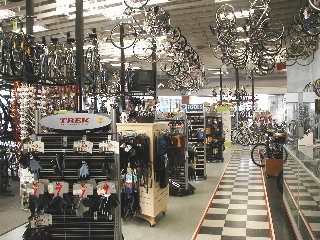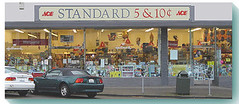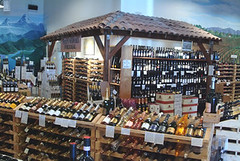ABA Midwinter Institute as a model program to assist the rebuilding of independent retail support networks
 Jax Bicycles. Everywhere you look, there are bikes, bikes...and more bikes. They're on multiple multi-level shelves. Some are hanging from the ceiling! From a customer report at Long Beach Report.
Jax Bicycles. Everywhere you look, there are bikes, bikes...and more bikes. They're on multiple multi-level shelves. Some are hanging from the ceiling! From a customer report at Long Beach Report.Shelf Awareness reports on the ABA Midwinter Institute, which is devoted to strengthening independent bookstores. Some of the sessions involved best practices advice from independent retailers in other industries. (Note: we can do these kinds of conferences locally). Here are some of the ideas shared at the conference last week:
 Standard 5 & 10 Ace variety store in San Francisco, California.
Standard 5 & 10 Ace variety store in San Francisco, California.1. Jeff Leopold, whose Standard 5 & 10 Ace variety store in San Francisco, Calif., sells hardware, cards, gifts, stationery, health and beauty, told the lunch crowd that "although the number of independent hardware stores are dropping, sales for independent hardware stores are growing. In our business, we're able to grow the store. We're working harder at it."Service, Leopold continued, has been "the No. 1 way to fight the competition" so he has hired people who can "smile and carry on conversations with customers. We want people who can engage customers and sweep them off their feet." He requires employees to undergo 16 hours of extra training a year beyond their initial training. Products and displays also set the store apart and "chains are slow in responding to new products and displays," so he looks for "new products every day. I want to make sure our merchandising is fresh and innovative. I want different products in endcaps every two weeks at least."
 The Wine Country Store, Signal Hills, California
The Wine Country Store, Signal Hills, California2. Randy Kemner, owner of The Wine Country, a wine retailer in Signal Hill, Calif., noted that even though wine consumption has undergone a revolution in the U.S. in the past 30 years and the wine business here is at "an all-time high," competition has grown, too. "You can buy wine at the local Sav-On, at 7 Eleven, the pharmacy, online," he said. "Costco is now the leading seller of Bordeaux and Champagne." He prefers to call his offerings "specialty" products and theirs "chain products. We have to offer products you can't get in chains."Kemner also emphasized the importance of the look of a store and tries to make his "gorgeous, presentable and attractive." He called himself an "avid enemy of fluorescent lighting."He, too, stressed customer service. "We always greet people with a smile," he said, adding that one study found it is 30 times more costly to develop a new customer than keep a current one. "Don't piss them off!" he advised.
3. Dave Hanson, owner of Jax Bicycles, five bicycle shops in Long Beach and Orange County, also emphasized service. His goal is for employees "to say hello [to customers] in five feet or five seconds," no matter what they're doing. In the tradition of Southwest Airlines, he said, "We try to make [customers] laugh or smile."Hanson trains staff members not to accept "just looking" as an answer when they ask if they can help. "We treat each customer as a guest. Imagine if someone 'just looked' [while visiting] your home." Obviously, he continued, customers "are looking for something."He also tries to teach his staff leadership and wants to mold the staff-customer relationship into one of "the customers being clients under the trusted care of an advisor." As of March 1, he is ending discounting and is training staff to "graciously decline discount requests." The store's price tags don't read "best offer," he said.
Index Keywords: retail



0 Comments:
Post a Comment
<< Home